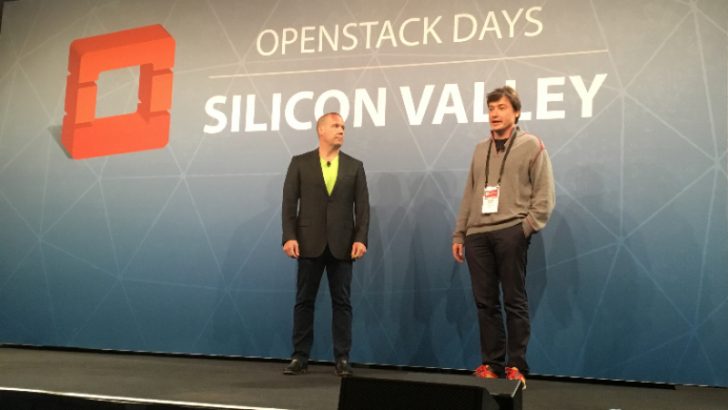
At OpenStack Days, Silicon Valley, SUSE and Mirantis have announced a plan for closer collaboration over OpenStack. The announcement came after Jonathan Bryce, Executive Director, OpenStack Project called for greater collaboration to secure the future of OpenStack. Mirantis plans to offer enterprise Linux support for its OpenStack customers. Meanwhile both companies will work towards establishing SUSE Linux Enterprise Server as a development platform for Mirantis OpenStack.
Both companies have also committed to proving support for Red Hat Enterprise Linux and CentOS. This is aimed at making Mirantis a one-stop shop for OpenStack support on the leading enterprise Linux distributions.
It’s all about giving customers a choice
We spoke to Mark Smith, Global Products and Solutions Manager, SUSE and Raj Meel, Product Marketing Manager, SUSE about what this meant for customers. Smith told us: “This is about collaboration and giving customers a choice. We pride ourselves on being an Open Source company. There is no technology lock-in or lock-out. We are giving customers a choice of an enterprise grade operating systems on which they can run OpenStack.”
One question that we were interested in was whether SUSE would be porting the Mirantis OpenStack to IBM POWER and z Systems platforms. “This is not about cross selling” said Smith. “We will continue to do our Linux on IBM POWER and z Systems and will sell our OpenStack to those customers who want it. There is no change in our commitment to OpenStack. This is just about allowing customers to chose which OpenStack they want to run on SUSE Enterprise Linux.”
Meel was keen that we understood that this is about Open Source and wider collaboration. He said: “Our strategy is open source and is an inclusive approach. If you make the pie bigger it works for everyone. It allows them [Mirantis] to deploy in places they could not. Big customers will have a lot of different environments.”
One question was how the two companies would split up support for products. SUSE already delivers support for CentOS and RHEL to its customers through existing support agreements. Meel told us: “We have an inclusive approach to supporting RHEL. Having Mirantis in the mix doesn’t change the strategy. When customers have an issue with CentOS or RHEL they will talk to both Mirantis and us. Mirantis will handle all the level 1 and 2 support while we will handle level 3.”
Red Hat unhappy at SUSE claim to support RHEL
SUSE saying it will provide support for RHEL has caused some annoyance within Red Hat. In a series of statements to CRN, Margaret Dawson, Senior Director of Product Marketing, Red Hat said: “…this makes no sense to us and would certainly be confusing and potentially dangerous for customers.” Quite how this would be dangerous is unclear and Dawson didn’t elaborate. We have emailed Red Hat to ask for clarification but at present there has been no response from their PR Agency.
In the same article Dawson also seemed surprised that a vendor would support another vendor’s product without some form of formal agreement. Enterprise support agreements have often seen vendors willing to take on the support of other vendors products. This is nothing new and in many cases those agreements are not subject to any agreement between vendors. In the Open Source market where access to the source code is part of the deal, companies are often willing to do whatever it takes to ensure software runs smoothly.
Mirantis also taking aim at Red Hat
On stage, Mirantis co-founder and CMO, Boris Renski said: “There is now only one conspicuous partner missing from the equation and we are hoping to get them at some point in time.” Renski is, of course, talking about Red Hat who so far has declined to work with Mirantis.
Earlier this year Mirantis beat Red Hat to win a major OpenStack deal with Volkswagen. This surprised many in the industry. Volkswagen is a very large RHEL user and Red Hat has been keen to ensure its customers only deploy its OpenStack implementation on RHEL. Dawson made it clear in the CRN article that despite Volkswagen’s decision, Mirantis OpenStack is not a certified product on its RHEL platform.
What will happen if Volkswagen runs into implementation issues with Mirantis OpenStack on RHEL? This deal may well see Mirantis offload the issue to SUSE. This would anger Red Hat even more. However it may also put pressure on them to resolve their differences with Mirantis.
Conclusion
This deal is good news for Mirantis. It continues to widen the number of platforms on which it can deploy its version of OpenStack. More importantly it provides a solution to its fractious relationship with Red Hat. This is a major commercial boost given how much of the Linux market Red Hat controls. Will Red Hat finally agree a truce with Mirantis? If not, it could see other big customers not only deploy Mirantis OpenStack but also turn to SUSE for technical support.



























[…] SUSE and Mirantis to collaborate on OpenStack […]